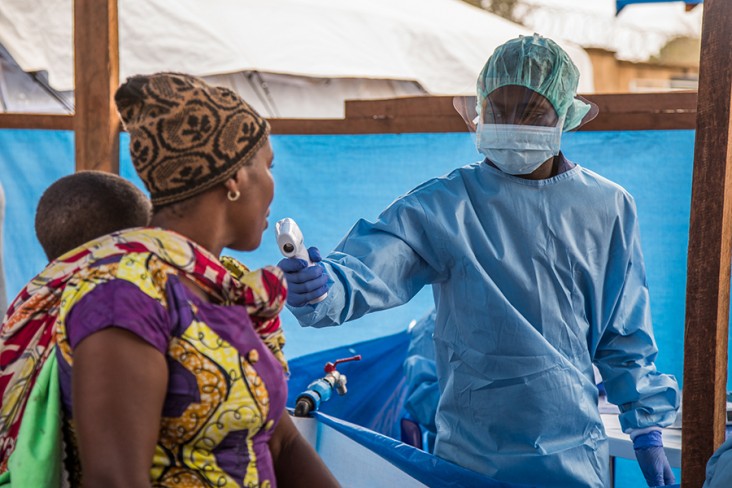- What We Do
- Agriculture and Food Security
- Democracy, Human Rights and Governance
- Economic Growth and Trade
- Education
- Environment and Global Climate Change
- Gender Equality and Women's Empowerment
- Global Health
- Humanitarian Assistance
- Transformation at USAID
- Water and Sanitation
- Working in Crises and Conflict
- U.S. Global Development Lab
Speeches Shim

Latest DRC Fact Sheet
12.18.2020 - DRC Ebola Outbreak Fact Sheet #2 ![]() (pdf - 400k)
(pdf - 400k)
View text version [pdf, 480kb]
Fiche d'information en français [pdf, 413kb]
12.18.2020 DRC Ebola Program Map ![]() (pdf - 1 MB)
(pdf - 1 MB)
Map: Ebola Outbreak in Équateur. [pdf, 1mb]
DRC Complex Emergency Fact Sheet #5 09.30.2020 ![]() (pdf - 593k)
(pdf - 593k)
Key Developments
The Ministry of Health declared the end of the Équateur Ebola outbreak on November 18, 2020, concluding more than two years of coordinated Ebola response efforts in the Democratic Republic of the Congo (DRC). USAID continues to responsibly scale down some response activities in Équateur while providing additional post-outbreak support for surveillance, rapid response capacity, and Ebola preparedness. USAID has contributed more than $373 million to support Ebola preparedness and response activities in the DRC and neighboring countries since 2018, including nearly $25.5 million for the Équateur outbreak response.
Conflict and insecurity continue to drive widespread population displacement and increase humanitarian needs in some areas of the DRC, particularly in Ituri and North Kivu provinces.
Approximately 21.8 million people in the DRC will likely require emergency food assistance through December due to conflict, the impact of COVID-19 mitigation measures on livelihoods, worsening macroeconomic conditions, and flooding, according to a September IPC analysis.
Conflict and insecurity continue to drive widespread population displacement and increase humanitarian needs in some areas of the DRC, particularly in Ituri and North Kivu provinces.
Non-state armed groups carried out two separate attacks against aid workers in eastern DRC in September, resulting in one aid worker death, one injury, and five abductions.
Background
Violence, restricted humanitarian access, poor infrastructure, forced recruitment into armed groups, and reduced access to agricultural land and traditional markets have contributed to the deterioration of humanitarian conditions in the DRC and triggered mass internal displacement and refugee outflows. Despite the implementation of a peace agreement in 2003, ongoing fighting between forces loyal to the Government of the DRC and various armed entities has contributed to high levels of insecurity and population displacement in eastern DRC. In addition, intensified fighting in central DRC’s Kasaï region since August 2016 generated new humanitarian needs that have persisted despite improved security conditions. The country has also seen large-scale epidemics, including outbreaks of cholera, Ebola, and measles in recent years. On October 22, 2019, U.S. Ambassador Michael A. Hammer redeclared a disaster in eastern DRC due to ongoing humanitarian needs specifically resulting from an Ebola outbreak in the region; Ambassador Hammer reissued a separate disaster declaration for the complex emergency on November 7, 2019. Heavy seasonal rainfall can cause localized flooding in parts of the DRC, resulting in damage to public infrastructure and increased humanitarian needs in affected areas. Ambassador Hammer issued separate disaster declarations due to the humanitarian impact of flooding in northern DRC and South Kivu Province’s Uvira Territory on November 27, 2019, and April 23, 2020, respectively. On June 8, 2020, Ambassador Hammer issued a separate disaster declaration due to a separate Ebola outbreak in northwestern DRC's Équateur Province.

Comment
Make a general inquiry or suggest an improvement.